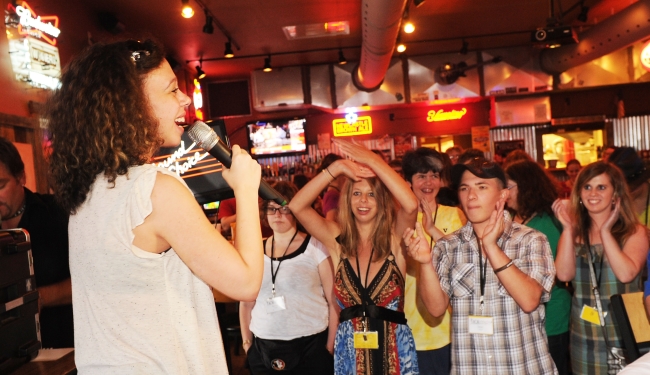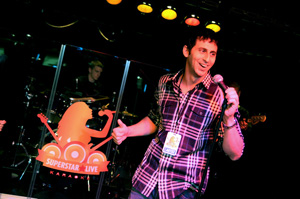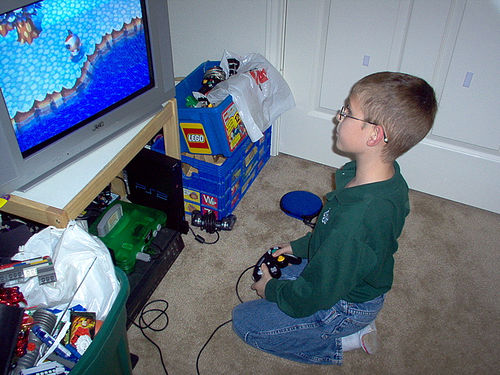The Karaoke Rules of Game Development

The act of going to a karaoke bar is filled with more dramatic tension than you might think. The sheer amount of questions in play at any given time is intense: What will the next person sing? Will they do a good job? Will they be ungodly terrible? Does this place have songs I want to sing? Will they call me next? Will the crowd like my song? What are the happy hour specials again?
Once the next person starts singing, the crowd quickly makes a collective decision. Great song but poor singer? The DJ turns down the mic volume and the crowd takes over vocal duties. Amazing singer? Watch as the crowd transforms into a rapt concert audience, complete with mini meet-and-greet with the performer afterwards. Terrible everything? Everyone takes the next few minutes to refill their drinks and chat with friends.
Yet the more negative outcomes can easily be avoided – as long as singers adhere to the three rarely seen, but inherent rules of successfully picking songs for karaoke:
Rule 1: Pick a song that you enjoy
Rule 2: Pick a song that you can sing
Rule 3: Pick a song that entertains others
Of course, the act of creation that takes place during a karaoke performance is not unique to the singing. Similar to any other creative undertaking, how you choose your song (or your project) greatly affects the outcome of the endeavor. Unlike other creative work, karaoke performances are over in minutes, as opposed to the hours, days, weeks or even years other creative work can take.
Naturally, this includes video game development. And whether your project is on track or troubled, investigating your current game through the lens of karaoke rules might yield hidden insights about what to do next.
Rule 1: Pick a song that you enjoy.
This is a tricky place to start. Often in game development (and in the real world), you will need to work on projects that don’t fire up your enthusiasm. For practical reasons, it’s necessary to continue working on these projects to pay the bills, care for loved ones and maintain your savings.

But over time, your distaste for the games you work on will begin to creep into the end user experience, lowering the enjoyment others get from playing them – much as a karaoke performance of a song you don’t really like may start off with faked enthusiasm that tapers off to a noticeable “when will this song end?” clock-watching energy.
In the meantime, you can adhere to this rule (and recover much-needed enthusiasm for your day job) by working on games you truly like in your spare time. Start a creative project that gives you true joy, and it will make it easier to get through the ones you aren’t as passionate about.
Sing the song you love.
Rule 2: Pick a song that you can sing
Maybe your goal is to work on a super ambitious game, or even something just outside of your current abilities. You might certainly get there with time and practice, but for want of skills, it just isn’t feasible for now.
In karaoke, this is the equivalent of picking a song outside of your vocal range. You may desperately want to sing Whitney Houston’s I Will Always Love You, but if you can’t hit those notes, it just isn’t going to happen today.
Instead, select projects that are within your current ability range. Doing this decreases the odds that they’ll drag on for months or years past your expected finish date, and the simple act of practicing will increase your ability to pick a more challenging project for next time.
Sing the song you can sing.
Rule 3: Pick a song that entertains others
So you’re working on a game that you like, and that is well within your abilities, but nobody likes it. Every time you have someone play it, the feedback is universally negative. Maybe it’s an incredibly niche gameplay design, maybe it’s built on inside jokes that only you and your friends share – for whatever reason, others don’t find it entertaining.

In karaoke, the equivalent would be picking the average Tom Waits song. Even if you sing it true to the original, Waits’ gravelly voice and aggressive delivery is probably not the best choice for a bar setting. Yet this also depends on context – the latest Katy Perry song might be fine for a college pub, but will probably go over miserably at a biker dive bar. Whatever the context you’re looking at, the song you pick must entertain others.
So what do you do if nobody likes the game you’re working on? You have two options: Work on something else that is more palatable to the audience you’re speaking to as you continue to work on the game on the side, or carry on with your game and start searching for its actual audience. Of course, the more niche and unconventional your game is, the harder your audience may be to locate, but in the age of the internet, the odds are high that they’ll be out there somewhere.
Sing the song others want to hear.
Whether you’re starting up a new project, knee-deep in development or trying to troubleshoot a problematic production, reflecting on these three points can help steer you to a positive experience for you, your players, and your future games.
